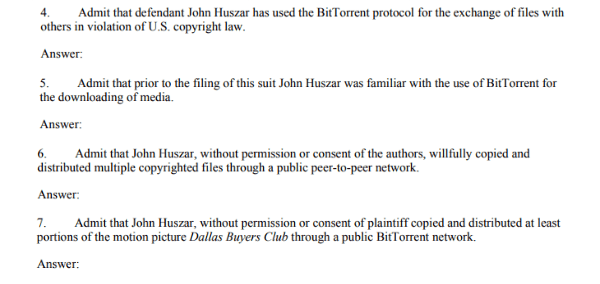Tor Exit Node Operator Dodges Bullet in Piracy Lawsuit

When pirates use Tor, it will then appear as if the traffic comes from this connection. This can lead to liability issues as Oregon resident John Huszar found out the hard way.
Back in 2015, the company behind the movie Dallas Buyers Club, which is known for its vigorous pursuit of online pirates, filed a federal lawsuit against the IP-address 173.11.1.241.
A few months later, this complaint was amended to list “Integrity Computer Services” as the defendant. As part of the proceedings, the filmmakers served a request for admissions, asking the defendant to respond to several statements.
This request remained unanswered, which turned out to be a crucial mistake. Not responding typically means that the court can assume the statements are true. In this case, it included an admission that Huszar unlawfully distributed a copy of Dallas Buyers Club, which seemingly opened the door to a substantial financial claim.
That John Huszar later repeatedly denied that he personally downloaded a pirated copy of the film in follow-up proceedings was irrelevant, according to the filmmakers.
Backed by the admission, Dallas Buyers Club proceeded to file a motion for summary judgment, asking the court to confirm that Huszar did indeed willfully commit copyright infringement.
This issue went to U.S. Magistrate Judge John Acosta earlier this year who, in his report and recommendation, sided with the movie company.
“The court finds the admissions resulting from Huszar’s failure to deny allegations in the operative complaint or respond to requests for admissions clearly establish Huszar willfully infringed on Dallas’s copyrighted material in violation of the Act,” Acosta wrote.
In most cases, these recommendations are accepted by the district court judge. That was bad news for Huszar, as it would make him liable for thousands of dollars in potential damages.
However, the order that came out this week shows that a previously overlooked issue turned the tables in favor of Huszar.
United States District Judge Michael Simon reviewed the objections that were pointed out by the defense, which highlight a crucial issue. When the request for admissions was served back in 2016, Huszar was not named as a defendant.
At the time the complaint listed his company Integrity Computer Services as the defendant. This was replaced by Huszar in an amended complaint a few months later. However, that meant that the request for admission (RFA) wasn’t directed at Huszar personally.
“The only defendant in the case at that time was simply “Integrity Computer Services,” (no ‘a/k/a’) and that is the only defendant named in the First Amended Complaint,” Judge Simon writes in his order.
“Huszar, therefore, was not the party served with the April 12, 2016 RFAs. The facts sought in those requests thus cannot be deemed admitted by Huszar for failure to respond, and the Court’s order finding such admission is withdrawn.”
As such, the court decided not to adopt the report and recommendation.

The procedural issue was missed by the defense initially, likely because Huszar was defending himself at the time, but the oversight has saved him for now.
“It is a technical issue that no ‘pro-se’ would likely catch. But RFA’s can affect a case significantly as was clear from the Magistrate’s decision. This is the error we brought up to the District Court’s attention that led to the ruling in our favor,” Huszar’s attorney J. Curtis Edmondson informs TorrentFreak.
While Huszar escapes a ruling of willful copyright infringement based on the admissions, the case is not over yet. The motion for summary judgment is now reverted back to Judge Acosta for consideration on the merits.
Huszar’s cross-motion of non-infringement is still on the table. Among other things, Huszar has argued that the evidence gathering software used in this case is flawed and unreliable.
Both sides are now allowed to submit supplement pleadings. Huszar ultimately hopes to prove that he is not guilty and have his legal bills paid. The filmmakers, on the other hand, plan to prove that the Tor exit node operator is guilty and demand damages.
—
A copy of United States District Judge Michael Simon’s order is available here (pdf).
Source: TF, for the latest info on copyright, file-sharing, torrent sites and more. We also have VPN reviews, discounts, offers and coupons.



Leave a Reply
Want to join the discussion?Feel free to contribute!